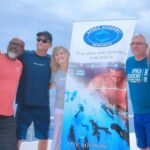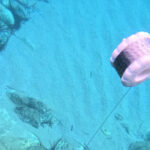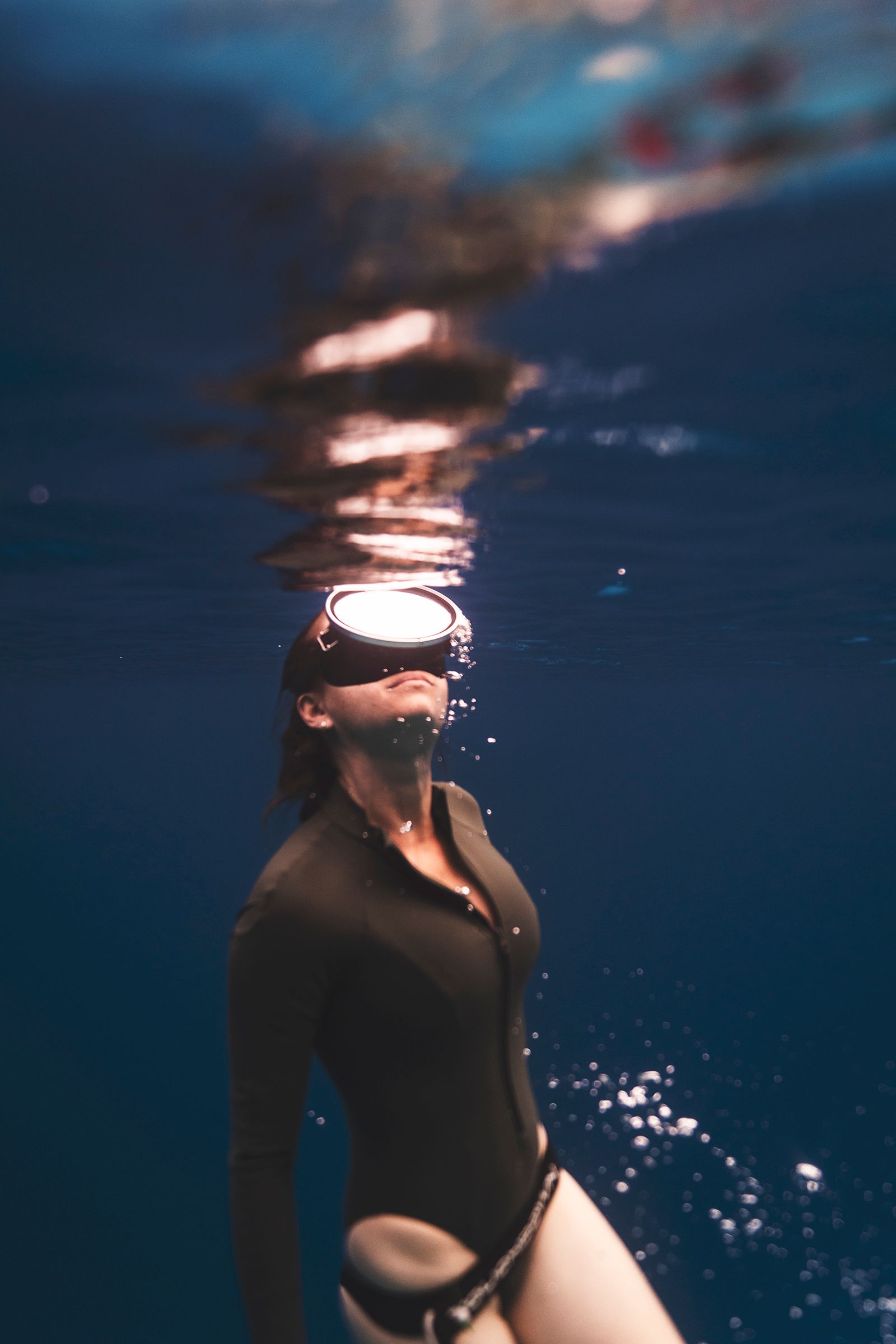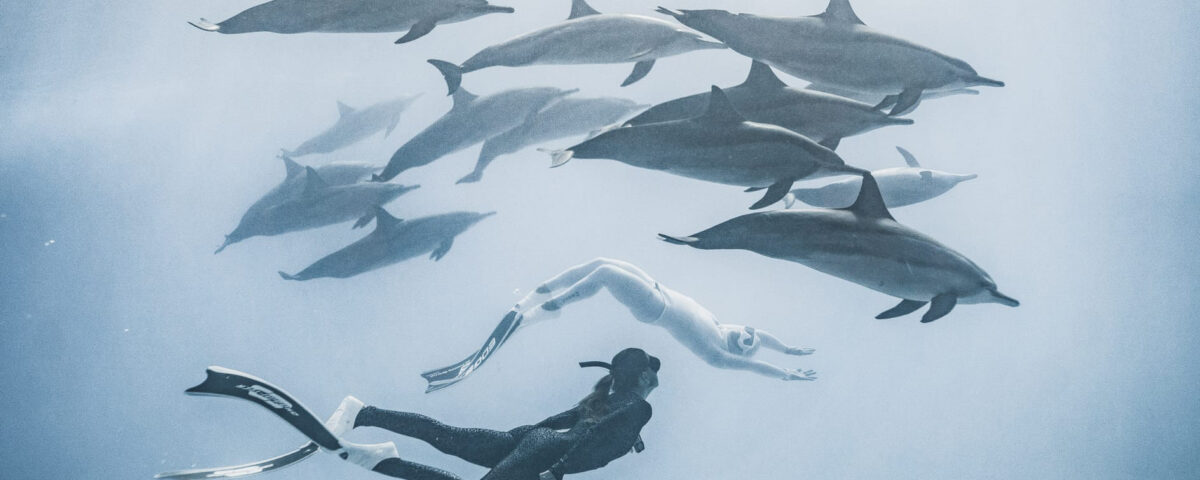Catherine Chouinard: From Canada to Dahab!

To the Maldives with Pelizzari and Apnea Academy
6 June 2025
C4: The New Floating Marker
13 June 2025When we talk about freediving, we often think of the Italian scene. And even when we chat with Italians abroad, it’s easy to relate to their experiences—lifestyles that have adapted to the major modern benchmarks of the sport. Catherine Chouinard’s story, however, is completely different, and for that reason alone, it’s absolutely worth telling
Filippo Carletti
Let’s start from the beginning! Cath, how did you get into freediving?
"I'm French-Canadian, and in Canada distances are totally different compared to what people are used to in other countries. Imagine this: a friend of mine would drive three hours just to attend a freediving class. I heard him talk about it, and still, I didn’t really understand it. But I was so curious. His dedication intrigued me, and eventually, I convinced myself to try it.
"I’ve always loved the feeling that water gives me, so I signed up for the AIDA 2 course in Montreal. It didn’t go very well. I could immediately recognize how beautiful the sport was, but the instructor didn’t manage to spark any particularly positive feelings in me—definitely not the kind worth driving three hours for! Some time later, though, I had the chance to dive deeper into it and feed this small spark that had been lit. That’s when I fell in love with it. I went to Honduras, where there are three main islands. Utila is where, thanks to an excellent instructor, I realized just how passionate I was about freediving and how much I wanted to pursue it."
Is that when you decided to move?
"It took me about two years to make the decision and start training in freediving, just as I used to with scuba diving. My plan was to go to Egypt and dive. I wanted to get good at it. I wanted to feel the water as part of me and do everything I could to improve. Now I’ve been living in Dahab for seven seasons! When I first arrived, I mostly spoke French, barely knew any English, and all I had with me was a mask and plastic fins, plus just enough savings for a couple months of training—two, maybe three or four at most."
How did you adapt to life in Dahab?
"When you pursue something that’s your passion, life changes. Mine definitely did! I met so many people—clients, students, of course—but also friends and amazing individuals who’ve stayed in my heart. I was also lucky to meet Emilia Biala, who now works at Deep Spot in Poland and was the first person ever hired there! She was especially kind and welcoming. She helped me settle in and asked if I wanted to assist her. I came from a training background, and I started wondering if maybe teaching was my path—helping others to connect with the water and improve. That’s how I became an instructor!"
From Canadian student to instructor in Dahab! A complete transformation. How is your journey as an instructor going?
"I became an instructor in 2019, right before COVID. By the end of that year, I had lots of students, all super kind to me. Word-of-mouth works really well here, and since they were all satisfied, they kept sending friends and acquaintances. I made it a point to be professional and do my best. At first, I used cafés and restaurants for facilities, but later I realized I wanted something more, especially for people who were shy or didn’t feel comfortable learning in crowded spaces. I also wanted a dedicated space to rest, teach, and hold events—a real home base.
"At the same time, I started offering classes to local Bedouins. Many of them are fishermen, and when accidents happened at sea, they would simply say their friend 'fell asleep in the water.' But that’s not the truth, and safety must come first. I believe working with locals and showing the value of a freediving instructor is crucial. I’ve been able to do that, and during the pandemic—when Egypt remained relatively open—it was especially helpful. Only seven African countries stayed open during COVID, and Egypt never fully closed its borders."
So do you run a freediving school now? What's your approach and how are your courses structured?
"I’m also the mother of a little boy who’s almost 2! The school is called Freediving Tribe Dahab, and together with other instructors, we offer a freediving approach that’s accessible and understandable for anyone who wants to learn and improve through coaching and training. We train hard, but we also have a lot of fun sharing time in the sea! We have many beginners, and we guide them all the way to reaching depths of 50 meters.
"I enjoy diving on the line, but I also love the sensations the water gives you when you move well. Another thing I really enjoy is underwater photography. There’s nothing like being captured in the water—it’s absolutely beautiful. We also organize trips—not just in Dahab—but further out, where we swim with dolphins from boats and admire the marine life in these seas! Turtles, manta rays, dugongs… just some of the species you can see along Egypt’s southern coast."
Do you miss Canada? Now that you're settled in Egypt, why do you think you took this journey?
"There are definitely things I miss about Canada—like living in a structured society. Being able to drink water freely, having top-tier hygiene. Those are all things I miss, like not having to meticulously wash fruits and vegetables—though here in Egypt, the flavor is something else entirely. I have to say though, COVID changed a lot, and today many people back home seem to carry deep psychological scars from it. But yes, some aspects of 'home' are hard to leave behind, like silence. Still, I guess that’s the price of living in paradise.
"At the end of the day, I think I did all of this for freediving. Because it’s so much more than just a sport or a lifestyle. The people you meet become friends, students become connections that don’t just disappear. And this passion has given me the incredible opportunity to travel, discover, teach, and do so many things—including swimming with dolphins. In northern Quebec, there are tons of whales. You can even hear them, but seeing them is incredibly hard because the visibility is so poor!
"Here in Dahab, sometimes it’s a bit much—everyone’s always talking about freediving, and you kind of wish someone would talk about anything else! But in a community centered around this culture, that’s normal. I also plan to return to competitions. I entered my first one in November 2024 and had a blast, even though I’d spent years doing safety and judging. So I think I’ll keep going!"
Last question: as an instructor and freediving enthusiast, what do you think of mermaiding?
"The first thing I thought was: this is probably the most expensive outfit I’ll ever wear! A lot of people judge the discipline just by looking at it, without ever trying it. But the truth is—it’s hard and demanding to swim with such a heavy tail. You need a solid foundation and good movement in the water, and then it becomes fun! I think it’s beautiful, and you can take stunning photos!"



